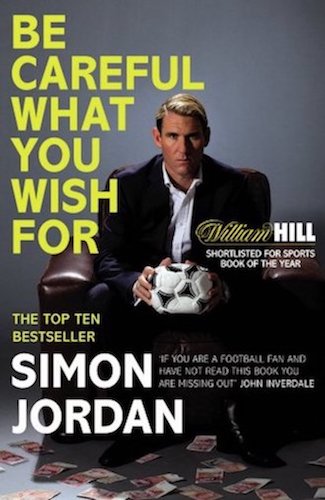FOOTBALL’S CRAZY
Why would anyone in their right frame of mind want to buy a football club? Ego and blind devotion aside, asking prices are high, players aren’t cheap and there’s no guarantee they’ll deliver where it matters the most – on the pitch! Simon Jordan, the award-winning former Observer Sports columnist, discovered the hard way that some prices are simply not worth paying. Be Careful What You Wish For is his sobering, testosterone charged account of how he built and sold his mobile phone company for £75 million only to lose the lot when he bought Crystal Palace, the club he’d supported from childhood. ‘A fool and his money are lucky enough to get together in the first place’ Jordan writes, although in fairness this man is nobody’s fool!
When the British born entrepreneur bought Palace in 2000, he did it for all the right reasons: his father had once played for the club while his son had hoped to follow in his footsteps. That alone should have made it a good match as Jordan had both the money and the ambition to bring the glory days back to Selhurst Park. So, what went wrong?
A brash, cocky personality doesn’t make him particularly likeable or the easiest person to get along with, yet without those qualities Jordan could never have made his millions or at the age of 36 become the youngest ever owner of a Premier League Football club. Prima Donna players were red carded; journalists he disliked were cold-shouldered; while bosses at the Football Association – the sport’s governing body – were either savaged for incompetence, or for upholding rules “geared to the well-being of players, agents and managers” at the expense of the club owners. Still, the FA gets off lightly compared to the players agents, who he regards as no better than parasites. His low opinion of them is understandable given their incessant meddling and off the scale greed!
While Jordan was in charge Palace was promoted to the lucrative Premier League, although the stay would be a short one. It was in 2008 that things really started to unravel after the club was put up for sale. What should have been a straight-forward business transaction degenerated into a high stakes game of poker, made worse by a global banking crisis and the aggressive demands of a hedge fund demanding the repayment of a loan. There could only be one winner. Palace was eventually forced into administration while Jordan was left to survey the wreckage of a once cherished dream. Although he denies any bitterness, he does admit to feeling angry for “putting myself in a position where people could take advantage of me”.
Football may be the beautiful game, but Jordan’s experiences lay bare a rather unpleasant underbelly. Duplicity is rife, gratitude runs in short supply while today’s friends may well turn into tomorrow’s enemies. It takes a rhino hide skin to survive the jungle and Jordan certainly has one of those.
Jordan’s ‘don’t mess with me’ attitude might not have been to everyone’s liking but it took guts and integrity to risk £75 million on something held so dear. Other club owners may have rejoiced in his downfall but at the end of the day it’s what the fans think that really counts, and Simon Jordan was one of them. He was the bloke who refunded their tickets when Palace under-performed; who was happy to share the odd pint with them at the pub, and who loved his club so much that he put everything on the line to make Palace one of the best. Surely that deserves some respect?
Reviewed by Juliette Foster
© Archant Community Media Limited used under limited licence




